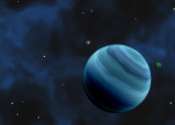Astronomers find a way to form 'fast and furious' planets around tiny stars
New astronomy research from the University of Central Lancashire (UCLan) suggests giant planets could form around small stars much faster than previously thought.

New astronomy research from the University of Central Lancashire (UCLan) suggests giant planets could form around small stars much faster than previously thought.
Astronomy
Jan 22, 2020
6
708

Combining powerful lasers and bright X-rays, Imperial and STFC researchers have demonstrated a technique that will allow new extreme experiments.
General Physics
Dec 19, 2019
0
247

For many years, for all we knew, our solar system was alone in the universe. Then better telescopes began to reveal a treasure trove of planets circling distant stars.
Astronomy
Dec 18, 2019
2
430

The most extensive survey of atmospheric chemical compositions of exoplanets to date has revealed trends that challenge current theories of planet formation and has implications for the search for water in the solar system ...
Astronomy
Dec 11, 2019
1
496

Researchers using ESO's Very Large Telescope have, for the first time, found evidence of a giant planet associated with a white dwarf star. The planet orbits the hot white dwarf, the remnant of a Sun-like star, at close range, ...
Astronomy
Dec 4, 2019
3
1196

A surprising analysis of the composition of gas giant exoplanets and their host stars shows that there isn't a strong correlation between their compositions when it comes to elements heavier than hydrogen and helium, according ...
Astronomy
Dec 3, 2019
1
122

An international team of astronomers reports the discovery of a new "warm Jupiter" alien world transiting a main sequence late F-type star on an eccentric orbit. The newfound exoplanet, designated TOI-677 b, is about 20 percent ...

As planetary systems evolve, gravitational interactions between planets can fling some of them into eccentric elliptical orbits around the host star, or even out of the system altogether. Smaller planets should be more susceptible ...
Astronomy
Oct 30, 2019
3
323

Planets that are even a little like Earth are hard to find. That's why when astronomers like Jennifer G. Winters come across a body that may be solid, rocky, and possibly have its own atmosphere, they get excited. And especially ...
Astronomy
Oct 24, 2019
4
134

What is the difference between a planet-satellite system as we have with the Earth and moon, versus a binary planet—two planets orbiting each other in a cosmic do-si-do?
Astronomy
Oct 3, 2019
0
138